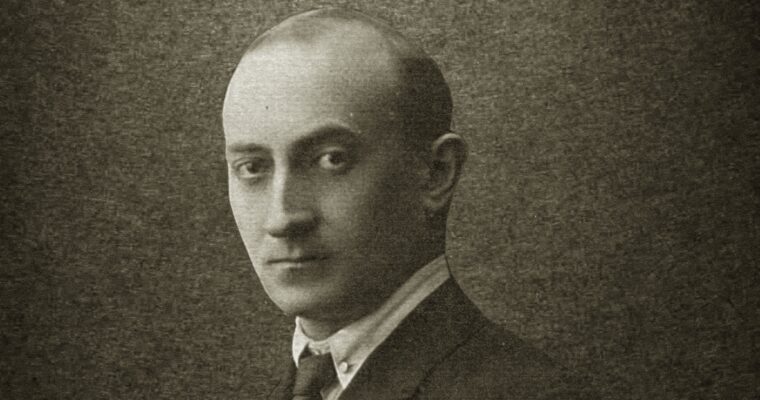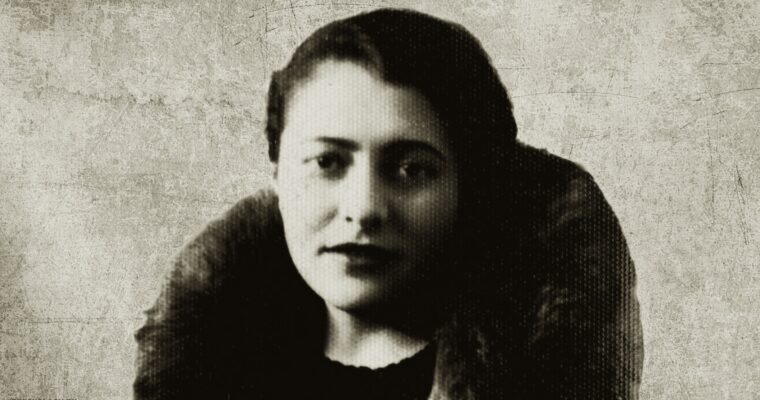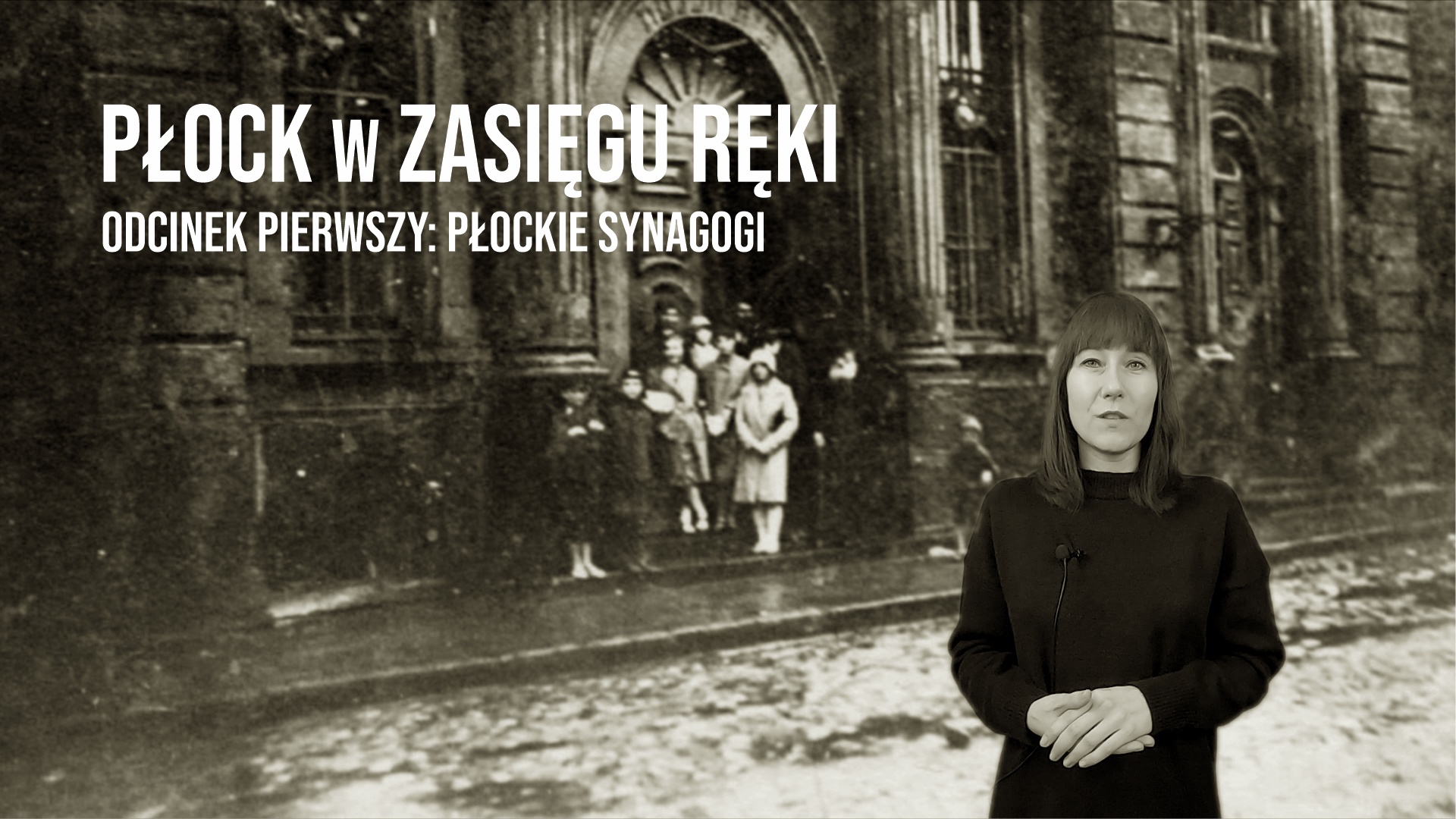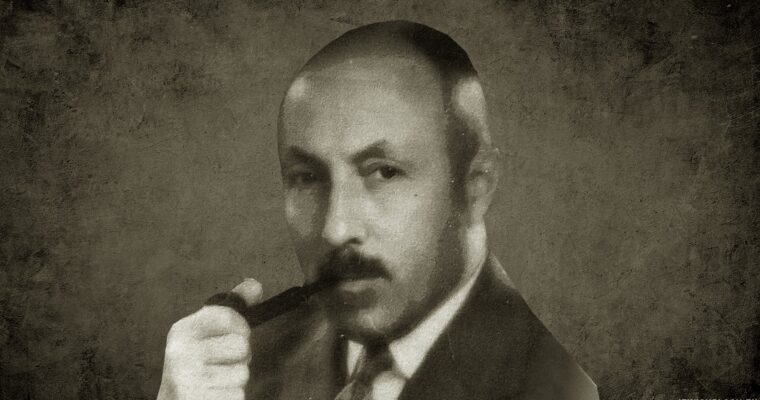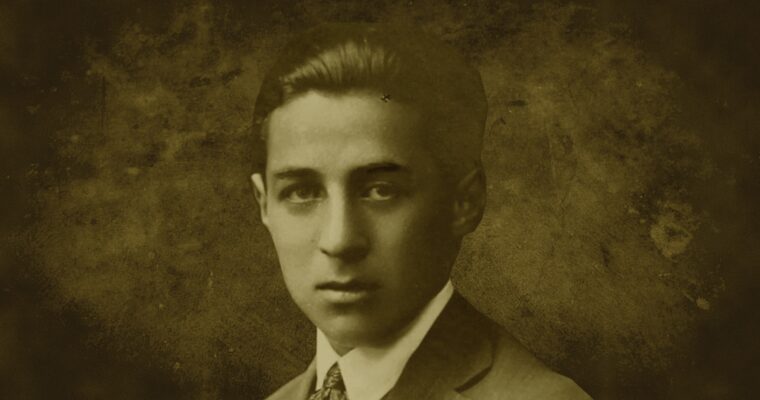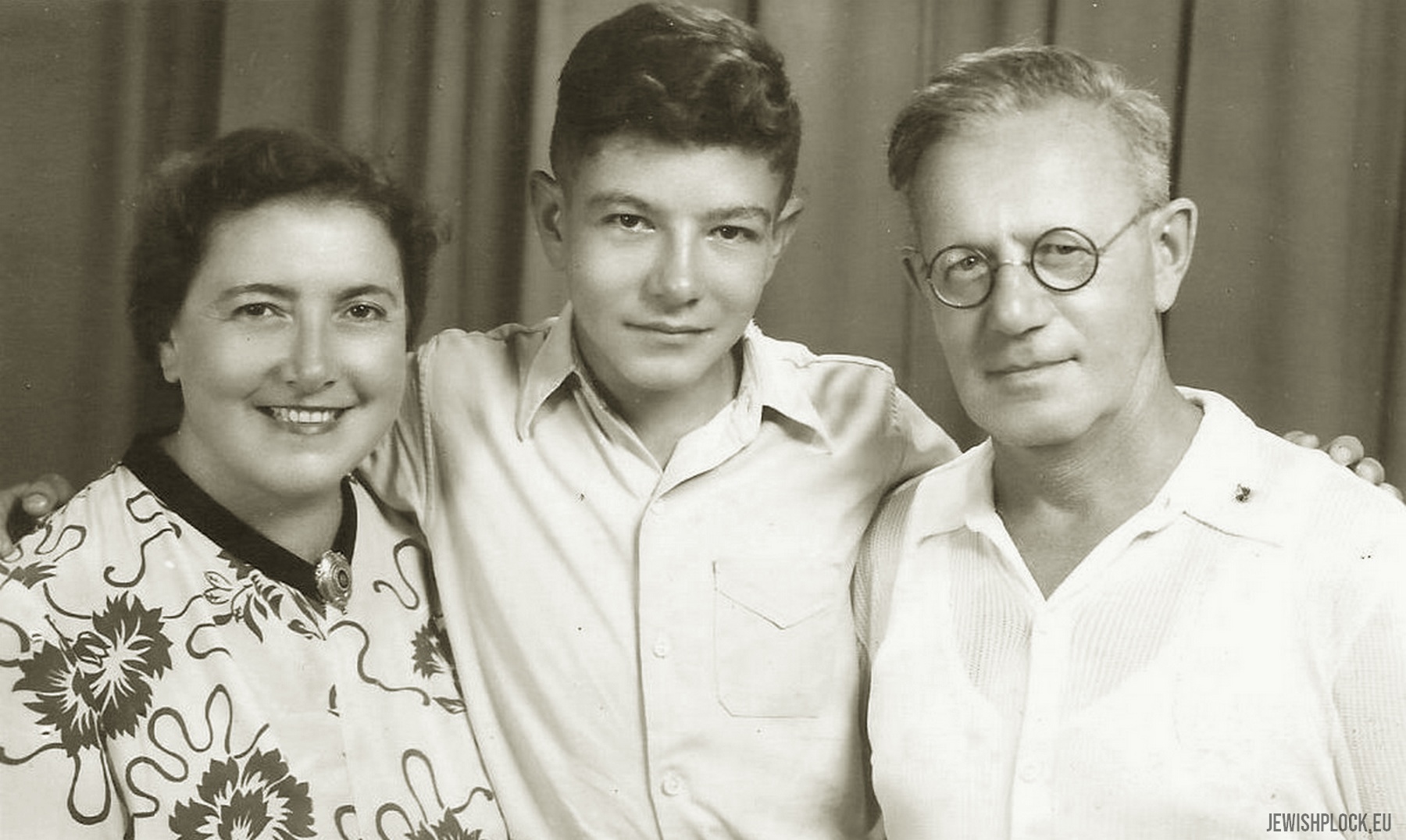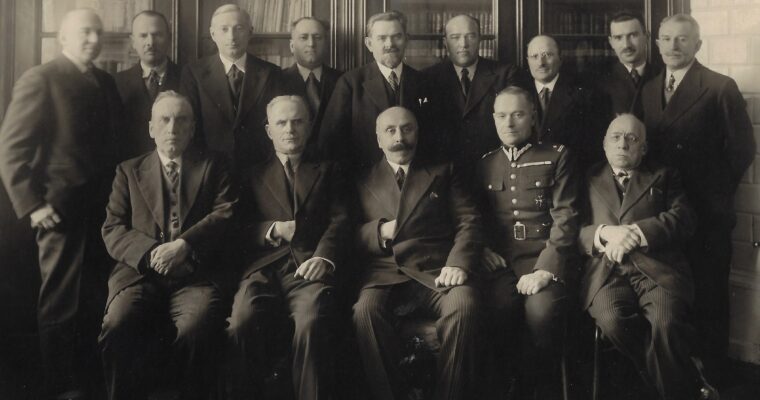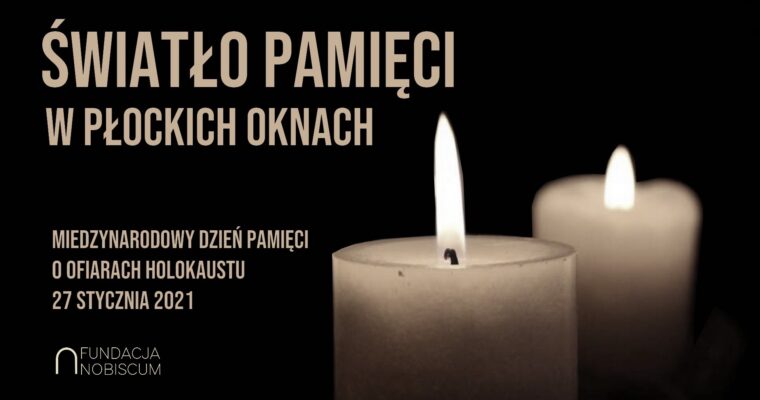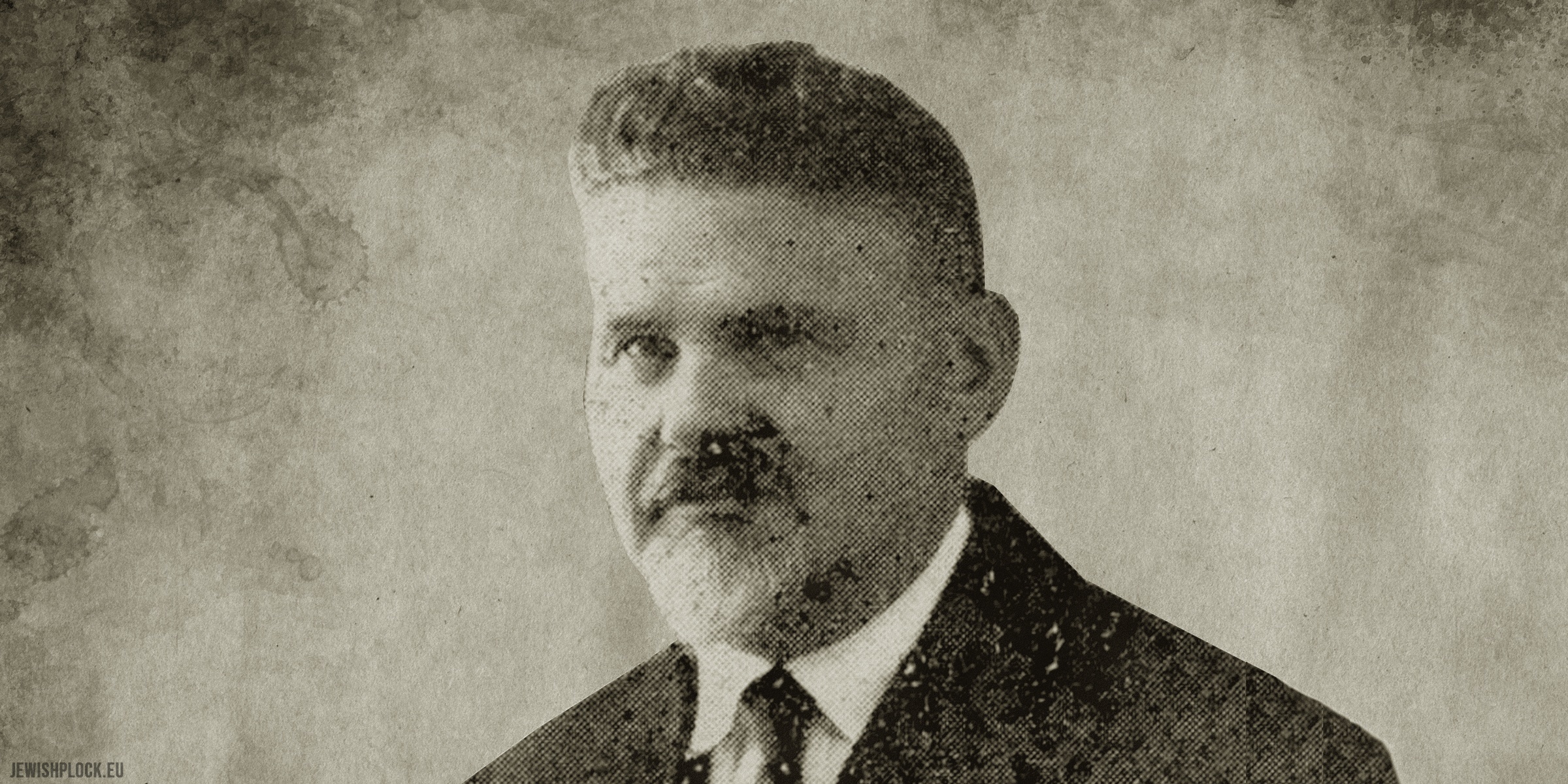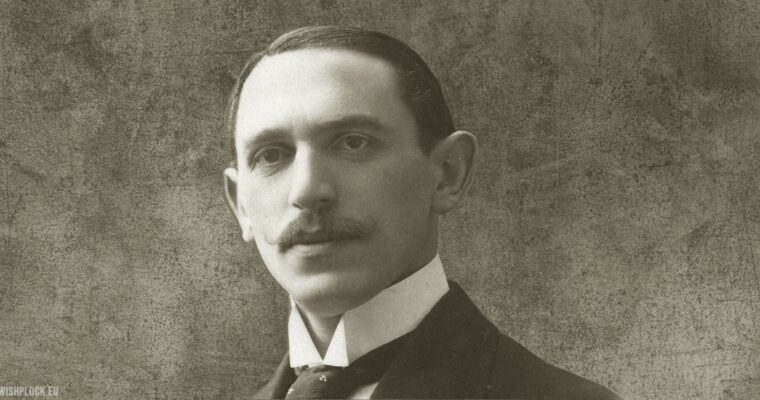Doctor Matias (Mateusz) Marienstras (Mariański) was born on September 22, 1900 in Płock. He was the son of Moszek (Mikołaj) and Maria née Krykus. He had two brothers – Wilhelm, who was also a doctor, Maksymilian – a pharmacist by profession, and sister Franciszka (married name Sztabholc).
The brothers studied in Vilnius at the famous Stefan Batory University. They were very athletic, they played in the football group of the Maccabi association. Matjas was the chairman of the canoeing section. He graduated with honors. He received his diploma on July 3, 1929 (specialization in laryngology and surgery). He remained at the university, where he lectured until 1932 with breaks. He had three diplomas, incl. Doctor of all medical sciences and the Institute of Physical Education in Warsaw. In Vilnius, he met Kazimiera, daughter of Matilda and Otton Butkiewicz, born on March 20, 1902 in Vilnius. Her grandfather was a famous rabbi and Zionist (he worked with Theodor Herzl, among others). Kazimiera’s mother was a rich person, she had her own train station, and she exported wood from Lithuania. She employed over 70 Lithuanian workers who liked her very much because she always helped and supported them materially. Kazimiera (Miroczka) was a pianist. She graduated from the Music Conservatory in Warsaw. She specialized in the music of Fryderyk Chopin and gave concerts. Matias and Kazimiera were married on July 3, 1932. For some time they lived in Płock (at Sienkiewicza Street), Matias had a doctor’s office here, and Kazimiera taught playing the piano.
Before I was born, they left for Warsaw, where I was born on July 27, 1939. As soon as mom was able to move, my parents decided to flee from Warsaw. It was very difficult because the Germans had already managed to surround the city. Nevertheless, they managed to leave for Vilnius. Their relief was short, however, because on June 24, 1941, Vilnius was occupied by the Wehrmacht. The Lithuanians, who hated communism, welcomed the Germans with joy. On July 4, 1941, the Judenrat was established. On September 6, 1941, a ghetto was created in which the Germans gathered all the Jews. In the ghetto, my father treated the sick as much as he could and helped those in need. When former employees of Matylda Butkiewicz (who died of cancer) found out that her daughter and her family were in the ghetto (where there was very little food), they contacted her mother and started smuggling various products into the ghetto. Parents distributed most of these products to hungry Jews. After some time their daughter was born, and my sister, whom they named Galina (Halina). After a year, the workers found out that the Germans planned to liquidate the ghetto. They made contact with their parents at the last moment. They told them that if they did not escape from the ghetto, they would be killed. The Germans kept their plans secret and doubled the guards guarding the ghetto. How to run away? Then my father, a doctor, had an idea. He took a black pen and made black dots for the children on their faces and hands. He knew German very well and wrote a medical document in which it was stated that the children had a very contagious disease and had to be taken to hospital quickly. He showed this document at the gate and the Germans were afraid to approach us. This is how our family left the ghetto. The workers were waiting in the street with a cart, they took our family and hid it far from the ghetto. The next day, the Germans drove all the Jews to the forest in Ponary, where everything was ready. They murdered thousands of people. They left no one alive.
After the ghetto was liquidated, the Germans looked for those who managed to escape. They promised Lithuanians that they would receive a prize of 100 zlotys for each Jew. Lithuanians searched every house. The situation became very dangerous, because if they found someone, they killed the Jews with the family that was hiding them. The workers who hid us were related to the Belarusian guerrillas. They asked if they wanted to take in the family of a doctor who speaks German. The answer was: we’ll be happy to do it! They warned my parents that the road was very dangerous, because the Germans were patrolling the border with dogs and shooting anyone they found. Now the parents had a big dilemma. In the end, they decided to put their daughter in a convent of the Franciscan nuns for good payment. My father promised to pay them even more after the war. He hid gold rubles for payment under the stairs of our house.
So we went on our way. We were with a man who knew the way, and moved only at night. We came to the forest where partisans were waiting for us. They took us to Grodno, where a house was prepared for us. The next night, the partisan commander arrived – a two-meter-tall giant man who could barely pass through the door. He said that there was a bed in the attic and that my father was to treat wounded and sick partisans there. He asked my father to think about how he could help them in their fight against the Germans. The partisans who brought us food gave us a picture of the situation. In Grodno there was the main base of the German army, from which they went into the forests to fight the partisans. My father told the commander to find him a job at a military gas station, from where military machines were leaving for the forests – he would mix gasoline so that the engines would break down, thus making it easier for the partisans to fight. The partisans had their people everywhere. They were not a small group, it was over 1000 people. Two days later, my father was referred to work at a military gas station. The German commandant of the station spoke to my father in German and as soon as he saw that my father could also write and count, he accepted him immediately. For several days he checked my father’s performance at work, and because he was pleased with him, he stopped controlling him. My father was very good at chemistry, after a while he made a liquid that damaged the engines after a few kilometers of driving. As there was little of this fluid, he added it to the first and last machine. After some time, the Germans realized that someone was adding something to the gasoline. One of the workers admitted that it was him and he was killed on the spot. For the rest of his life, my father had remorse that someone had to die in his place. The partisan commander explained to him that this was a war and that there had to be casualties in order to win. And he was needed and he had to live. At night, they brought us the wounded and my father operated them. My mother helped him, she cooked food, I, a small kid, stood on a chair and held two oil lamps so that my father could see when operating. That’s how I got used to seeing blood, open wounds, operations. My father taught me to sew wounds, and I did it so well that when I was in the sailing school, I was asked to sew torn sails (back then they were still made of cloth). The Germans knew that something was wrong with our house. Every two weeks or so, and always in the middle of the night, soldiers with dogs and the Gestapo came, chased us out of the house (whether it was snowing or raining) and searched the house. They finally burned it down. The partisans took us to a new house, near the forest. One night they brought their commander to us, who was badly wounded and had a few bullets in his stomach and chest. There were several dozen partisans around the house who loved their commander so much that they were ready to fight for him to the death. My father operated on him, took out the bullets and sewed the wounds up. He said that an ordinary man would not survive it, but that this powerful giant would live. After a few days the commander got up and said that he could not rest while his men were fighting.
In the town, people caught Jews to get a few rubles. When they tried to catch us, my mother screamed and cursed like a peasant from the countryside that these people were sure that she couldn’t be Jewish. That’s how she saved our family.
The partisans were very grateful to my father that he saved their commander. Meanwhile, the war changed direction. The Red Army began to win and drive the Germans out of Russia. The commander was informed that if he and his partisans expelled the Germans from Grodno, they would be able to join the Red Army, they would receive uniforms, ranks and medals. Before storming the town, the commander came to us and said that family and friends had to hide in the basement, paint a red star on the door, and thus we would stay alive. Two days later, a partisan we knew came and said that the war in Grodno was over, “We won”. When we went out the streets were red with the blood and bodies of German soldiers. Gestapo men hung on trees and poles. There was no end to the revenge of the partisans who lived in forests like animals for several years. They didn’t leave any of the Germans alive. They even bet on a bottle of vodka through how many Germans a bullet would pass. The next day, the commander came in a general’s uniform with the decoration of a Russian hero. He told my father that he had not forgotten who had saved his life. He took my father with him and showed him a big house which was the German military hospital and said that in a few days they would bring beds and medical instruments and that from then on my father was the hospital’s director. Then he asked my mother what she did and when she said she was a pianist he said he liked music very much himself. He showed my mother a big house and said that from now on it was a conservatory, they would bring pianos and other musical instruments, and that she was now the director there. Finally, he took the whole family to a beautiful villa (the Gestapo commander used to live here) and said that this was our home. He addressed me, announcing that he remembered who kept the kerosene lamps during the operation. The next day, one of the rooms was full of toys.
At that time, nothing was worth more than food. At home, my father also had a clinic. Sick people came to us from different villages and paid for the treatment with food (chickens, eggs, bread, meat, etc.). We had everything. There was a large table in the living room and every few days important people in the town came for dinner and vodka. It was the place where the most important decisions concerning the town were made.
It was the time to find mom and dad’s family and, of course, their daughter Galina.
My father Matias had two brothers – Wilhelm and Maksymilian. They both did not survive the occupation. Wilhelm’s son, Danek Marienstras, lives in Israel. He was an engineer and married Krysia. They have no children and live near Tel Aviv. Maksymilian has a daughter, Danuta, who is married and lives in Australia, in Melbourne. She has two sons. Franciszka’s sister and her two daughters fled to Siberia during the war. Her daughter Zosia married Dr. Garfingel and has a daughter, Liora, who lives in Milano. Her second daughter Ala is married to an engineer, has two sons, the younger one is an ophthalmologist and the older – an engineer. The younger son named Ran (Rysio) is often examining my eyes.
My mother Kazimiera had three sisters (she was the youngest). One of the sisters, Basia, did not survive the war. The oldest sister Anne (Schaizik) married a very wealthy exporter of silver Siberian fox fur. They lived a wealthy life in Siberia. After the revolution, they fled to China. They were also caught by the revolution there, so they again fled – this time to Japan. The Japanese expelled them, then they went to Canada. Her husband was doing business there, they visited us in Israel. I went by boat to Montreal and the whole family came to visit me. Mom went as a tourist to Montreal to visit the family as well. Niuta – her third sister – was in the communist party. She was the chief secretary of Khrushchev. Her son Felix was an avironautical engineer, he wanted to be an aviator, but because he was a Jew, he was not allowed. Being depressed, he committed suicide. She was also looking for her sister. Since she was in a high position, she ordered the KGB to look for Mom. A few days later they found our family. There were few telephones in Grodno, one was at the general (commandant), who became not only the commandant of Grodno, but also the entire region. He got a call from Moscow from Khrushchev’s office to ask my mother to the phone immediately. Everyone got very scared – what could it be? They took my mother to the commandant and there she heard her sister’s voice. They both cried and Aunt Niuta said that she would try to come and visit. A week later, news came to the town that important people were coming to visit, that there would be Khrushchev’s secretary and a general. At that time, the war was still going on, but my mother’s sister got a war plane for her own use for 30 hours. At the airport, everyone stood with their mouths wide open as the two sisters ran towards each other, hugged and cried. They talked all night and told each other how they had survived the war. Aunt brought me very expensive gifts. Before departure, she promised my mother that she would be looking for Galinka. Parents got special permission to go to Vilnius. It turned out that the entire street where the monastery was located was completely bombed. People said no one survived. My parents’ house was also demolished, someone found and took the hidden money. The KGB did not find Galina, even a formal letter was issued from Moscow to the Vatican on this matter. But there was no return message.
My father was very fond of practicing medicine. He performed modern operations and was a famous surgeon. There was a specialist violin maker in Russia, it was said that his violin was almost like a Stradivarius. He started to lose his hearing, he visited many specialists, but no one could help him. Finally he turned to my father. After the examination, my father told him that he could perform a specialized operation. If the operation fails, his condition will not worsen, but if it succeeds, his hearing will return. The violin maker cannot work without hearing. My father had a very long operation, he managed to restore his hearing. He didn’t know how to say thanks, so he made a beautiful violin for me with my name and his name. I had to play this violin for two years, until I became so frustrated I broke the bow on my teacher’s head and so it was over.
After my mother’s sister visited, our family became important. At the end of the war, there was a big parade in Moscow, my sister invited my mother and she took me too. At the parade, I sat on the general’s back and waved to Stalin. I got the general’s star from his cap and all the kids envied me because I was wearing it strapped to my shirt.
My father dreamed of going to Israel all the time. When he collaborated with the partisans, they helped us to prepare false documents with the name of Mariański. We were able to return to Poland with these documents. One of the partisan sergeants was given a job to write down the names of the citizens of Grodno. He could only write the name of one month in letters – January, and numbers only up to 5, so thousands of people who lost their documents during the war had their date of birth entered by him between January 1 and 5. My father went to him to write out a birth certificate for me, he asked what date should be written. My father told him that on the first day after New Year’s Eve, everyone was still drunk, on the second, the alcohol had not evaporated from their heads, so it’s the best to write down 3 January. The number 19 was printed on the document, so the sergeant asked what else to add. Father told him to write “40” because it is the closest to the truth. Parents did not change it afterwards and the date in my documents is still 3 January 1940. Since then, I have had my birthday twice a year and I have been receiving gifts twice.
And so on August 25, 1947, we went to Poland (there was an exchange of citizens between Russia and Poland). Before leaving, the general asked my father why we wanted to leave: we live like in paradise. My father replied, “You have a homeland for which you fought, I also have a homeland – Israel, and I want to be there.”
We left Russia for Poland in freight cars. There were 2-3 families in each car. We went to my father’s family – aunt Frania, her daughter Ala with her husband and two sons, who lived in Gdańsk-Oliwa. My father presented documents confirming his work in Russia and very quickly obtained a permit to work as a specialist doctor. It turned out that the house they once bought survived, they found a buyer for it, sold it and bought a flat in Gdańsk-Wrzeszcz on Wajdeloty Street. My father, apart from working as an ENT specialist, was also the chief doctor of schools in Gdańsk. My mother started working as a piano teacher at the conservatory in Sopot. I went to school and became a scout. My father also treated divers who excavated ships sunk during World War II in the Gulf of Gdańsk (there were cases where divers died or suffered serious accidents as a result of pressure loss or pressure differences). Their families came to us with flowers to thank us for their rescue. At that time, the ports were guarded by the army and the police. My father had an official permit to stay in ports and to sail on port boats to help the divers. More than once he took me with him and I was known as the son of a divers’ doctor. I always took a good friend with me, with whom I hung around in the port, between all the ships.
All this time, my parents tried to get permission to go to Israel. They were told that my father’s job was so important and specialized that he could not leave. Meanwhile, with the money that was left from the sale of the house, my parents bought half of a small hotel in Zakopane and we went there every winter for holidays. My father knew I liked boats, so he bought us a canoe and taught me how to row. Later, he sold the canoe and bought a small sailboat that we used to sail on the Bay. My parents were still wondering how to go to Israel. My father even thought about taking a boat to the island of Bornholm (not far from Szczecin). In the end, they decided that my father would end his work in Gdańsk and we would go to Warsaw to apply for a permit to leave at the main offices. My father went to Warsaw and found a job as a medical school inspector and a doctor for an orphanage in Śródborów (near Otwock). We lived near the orphanage. I spent days with the children, ate with them, went to school, did my homework in the evenings and came home at night. There were orphans in this house, left by their parents in Polish families, because the Germans would certainly murder them. After the war, various institutions gathered these children and sent them to orphanages, and then to Israel. After a year, my parents decided that commuting to Warsaw was a waste of time and that we had to live in the capital itself. Thanks to my father’s work, we got an apartment in the attic of the school. I was very pleased because I attended the school located downstairs. Mom found a way for the whole class to learn to play the piano. She wrote easy melodies and songs, each student had small wooden keys in front of him, one played a real piano and the rest played these keys. The Minister of Education himself came to see this invention and my mother received a letter of praise for her education system. Parents tried to find contact with someone in the office who would help them with moving to Israel. Mom believed that the number “13” was her lucky number. When she dreamed of her mother, she was convinced that the next day would be a happy one for her. After one night, when she dreamed about her mother, she was sent to some important headmaster, and when she saw that his office door was numbered “13”, she knew she would now be allowed to go. And so it happened.
We got a permit to leave Poland. On its basis, we received passports (intended for single use), we started packing and getting ready for departure. But it wasn’t easy. The parents were told that there was nothing to transport them, as there were more than twenty families in a similar situation. They asked the Israeli consul for help. After many visits to various offices, he told us that there was only one option to leave: buying a sleeper wagon from the railroad office, which cost $ 12,000. It was a huge sum at the time. After negotiations, they dropped the price, and various philanthropic organizations raised $ 2,000. The parents had money from the sale of the apartment and part of the hotel. They donated $ 8,000 and the rest was collected by the families who traveled with us. The wagon was registered for my parents. It was attached to a train going south. It was August 23, 1952. Halfway to Czechoslovakia, at one of the stations, the wagon was moved to a side line and the station manager said he did not know when the train would be allowed to continue. Parents realized that they had to pay. On the way there were other stations where we had to pay, finally we crossed the border of Czechoslovakia. The wagon was attached to a train that was going to Vienna, Austria. There, people from the Israeli immigration office were waiting for us and told us that now we are going straight to the port of Naples in Italy and from there by boat to Haifa. They asked what to do with the wagon and the parents decided to donate it to serve other emigrants. We came to Israel on a ship called “Artza”. On August 31, 1952, we went ashore as legal citizens of Israel. My father knelt down and kissed the ground, because his dream came true. With tears in his eyes, he told us: “My dear family, we are now at home. We got this country from God ages ago and we will stay here forever”. We did not come by legal emigration transport, therefore no one knew about our arrival. New emigrants were located in places with tents, until their houses were built. We were placed near Haifa, where instead of tents there were tin houses. In winter the conditions would be good, but we came in summer and the sun warmed the sheet metal so much that it was impossible to enter. Everyone was sitting in the street waiting for the night to come. My father always had good ideas. He took some sheets, soaked them in water, put them on the roof. The water evaporated and the roof cooled. My father attached a rubber pipe to the tap and wet more sheets. Soon all the houses were covered with them. After a week our family found out that we were in Israel and came to take us to their home in Netanya. It was the Sztabholc family (of my father). A doctor with his mother, wife and two sons. Sztabholc was the commander of the police in Lviv. There was a great pogrom of Jews and he was also murdered. Doctor Sztabholc helped us get settled. My father had to pass exams to obtain a permit to work as a doctor. When he came to the hospital for the exam, it turned out that the examiners were his former students. They did not want to examine him, but my father did not agree and asked to be allowed to perform the operation. After the operation, he was told that permission was waiting for him at the secretary. My father started working and we rented an apartment near the residence of our family for our first paycheck. My mother’s sister from Canada bought a piano and sent it to Israel so that my mother could start working. In Israel, everything was new to us, we didn’t know the language, we didn’t know the strange letters, we had to write from right to left. We slowly started learning, me at school, my parents at the courses.
There was a shortage of doctors in the small towns on the outskirts. My father had a wide choice of jobs, but because he was a patriot, he wanted to work where there were no medics. He was sent to the town of Afula and had to travel by two buses to work for nearly two hours, sometimes standing. Doctors asked the communication directorate for a special card for my father, with which he could enter the bus without waiting in queues, and the drivers provided him with a seat. During the week he worked in a local clinic, traveled to nearby villages and kibbutzim for two days and treated people there, and on one day operated in the local hospital.
After almost a year, an old man called Mejerson came to us and told his mother that he had studied with her grandfather, who was a rabbi. He was a very good student, and such students always lived in the rabbi’s house as if they were his family (for 3-4 years). He wanted to pay back now. He was the mayor of Hadera for 25 years and had a very good and cheap apartment in the center for our family. My parents agreed because for my father living in this city meant commuting to work by one bus only. My mother gave piano lessons, and I studied at school for another year.
At the end of the school year, it was necessary to decide what to do next. My mom wanted me to go to middle school and then to university. Our neighbor’s son, also a doctor, told me that he had enrolled in a marine school. A neighbor told my father that the school was of a very high standard and had the best teachers. There is a military regime, students are called cadets, graduating from school, students receive the rank of a naval officer and a diploma with which they can enter any university or technical college without exams. To get into this school you have to pass very hard exams. My parents talked about it and my father knew how much I liked boats. He decided that they would enroll me in junior high school and send me to exams as well, I would not pass them for sure, and their conscience would be clean. When signing up, it turned out that there are already 180 applicants. I was studying very diligently because I wanted to pass. The exams were really tough and lasted three days. We were sure that they would only accept the best and that I would not be among them. We were pretty sure because more than a week had passed with no answer. And then an official letter arrived that I was admitted as a cadet to the Marine Officers’ School.
A year has passed this way. My father got a job in our city of Hadera. This meant the end of travelling by buses or a jeep. He worked five days in the local clinic, and one day he did operations in Haifa. Two years later, when I was studying for my third year, I was told that my mother had called, that my father was feeling unwell and that I should come home. When I got home and saw my mom’s face, I realized something was wrong. My mother said in tears that my father came home from work and went to rest. When he didn’t wake up, she called his fellow doctors and they tried to do what they could, but nothing helped. My father had a stroke and died. I entered the room where he was lying and kissed my dear father with a kiss. It was March 13, 1957. My father was 57 years old. The next day, when I got up, my mom told me to go wash my head because something white on the right was stuck to my hair. It turned out that the entire strand of my hair turned gray overnight.
With time, my mother met the sister of our first president, Wajcman, who was the director of the conservatory. They became friends, and my mother ran a branch of this conservatory in Hadera. She organized very popular concerts for her students and worked this way until the end. She died on May 14, 1997. She was 95 years old.
I graduated from the Israeli Nautical Collage with a third officer degree. I worked for the Israeli international shipping company Zim Integrated Shipping Services Ltd. For many years, I navigated all types of ships, then I specialized in tankers, and finally VLCC tankers, which can carry even 200-300 thousand tons of oil. In the meantime, I received my bachelor’s and master’s degree at the Haifa University and the doctorate in the States. At that time, I was one of 10 active PhD captains in the world. Then I became a commander who was the superior of all captains of crews and ships of the ZIM company. I served in the Israeli Navy and retired with the rank of Second Lieutenant Commander. I wrote a 345-page story of mine and my family, titled “Nazis, Pirates, and Fleet Gentlemen”, which was very well received (I received many congratulatory letters from captains, officers and naval generals).
Now, in retirement, I am a volunteer of many institutions (the police, the Naval Museum). As a good pensioner, I am at home with the wife every man would like to have. I fix everything at home and take care of the garden. My fellow captains come to visit me often, we sit with a bottle of good cognac and remember the adventures from the sea. The first toast is to the health of small ships (because big ships can handle themselves). And then the Norwegian toast “to my health, yours and the health of all beautiful women.”
Zvi Mariański
